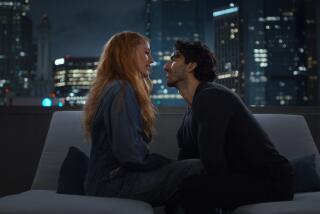Director out to ‘rebuild Iraq’s artistic heritage’
- Share via
BAGHDAD — An Iraqi soldier, blood oozing from a wound to his stomach, clambers over the smoldering ruins of a bombed-out building in Baghdad and collapses in a heap, agony etched on his war-weary face.
“Cut!” shouts Oday Rasheed, and so ends the first take of the first film to be shot in postwar Iraq.
Using their own limited funds and with the actors working free, Rasheed and his crew are shooting “Ghayr Saleh” (Under Exposure), a movie examining Baghdad in the aftermath of the U.S.-led war to overthrow Saddam Hussein.
“I wanted to look at what it means to face death,” said first-time director Rasheed, 30, on the set Friday.
“Maybe it could be about any war, but it’s about the experiences of Iraq and especially Baghdad.”
Rasheed’s film is not only the first to be made since Hussein was ousted in April. It is also one of very few to have been made in Iraq since 1991, when the United Nations imposed an embargo on the country after the Persian Gulf War.
The blockade made it virtually impossible to get hold of film and other equipment, so the industry fell into ruin.
Before then, Iraq actually had quite an active movie industry -- the capital even boasts the Baghdad Film Studios -- although directors were expected to be sympathetic to Hussein and avoid politics or other sensitive topics.
“The only difference between making films now and making them before is that now there is no taboo -- whether it’s politics, religion or sex, we can do it,” said Rasheed, who cites Federico Fellini, Pier Paolo Pasolini and Quentin Tarantino as his influences.
After about three decades of suffering under Hussein’s rule, the pool of writers, cinematographers and other artists in the country has dwindled to a mere puddle, he said.
“I’m so worried about the arts in Iraq right now. There is too much old-fashioned thinking going on, and no one realizes how desperate the situation is,” he said.
“As we try to rebuild the country physically, we also need to rebuild Iraq’s artistic heritage.”
He hopes to finish shooting in two months. After that?”My aim,” Rasheed said, “is to have the film shown at Cannes next year. I think that is what we deserve after all this.”
More to Read
Only good movies
Get the Indie Focus newsletter, Mark Olsen's weekly guide to the world of cinema.
You may occasionally receive promotional content from the Los Angeles Times.










